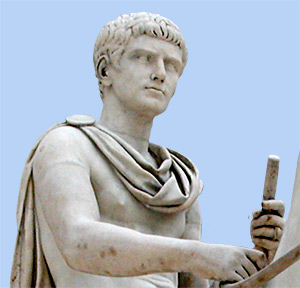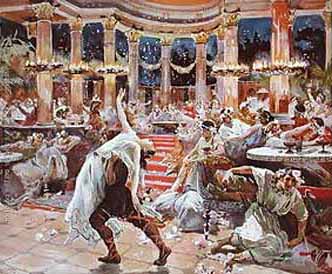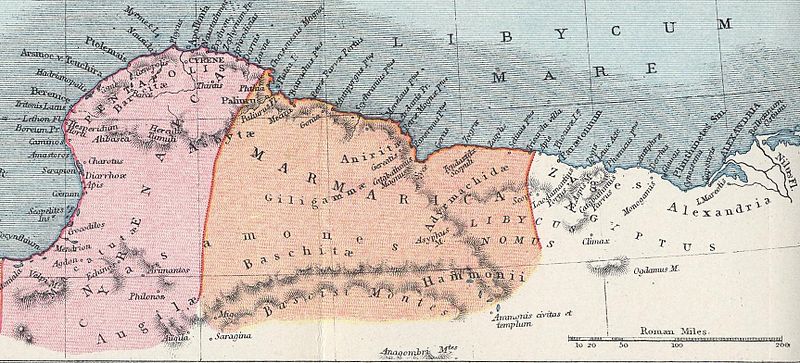Overall the majority of the involved parties emerged all the better from the trials of 4BC. The brothers
Iullus, Curio and
Claudius Pulcher found themselves emancipated from the long shadow of their late brother
Antyllus' failed rebellion[1]. The Emperor and
Caesar Tiberius proved the full extent of their Roman virility, ignoring the wiles of their womenfolk and foregoing despotic favoritism while also showing clemency and respect for tradition.
Livia Valeria not only lived to see another day but salvaged some respectability and a comfortable retirement in an easily-accessible island off the coast.
His spirits buoyed by good press,
Caesarion actively applied himself to the government of Rome and the city's affairs. High on his list of priorities was the matter of four generals, voted triumphs by the Senate but so far prevented from enjoying them by circumstance. These men were L.
Autronius Paetus,
L. Cornelius Balbus,
L. Sempronius Atratinus and
P. Sulpicius Quirinius. All four had fought in Africa against Berber tribesmen and desert raiders in the interior of Africa Proconsularis and Tripolitana. Caesarion was reluctant to allow any of them the splendor of a full triumph. The
ovatio[2] (itself a lower form of the triumph) was thus adapted into the novel
ovatio maius: the men were granted the
ornamenta triumphalia[3] and the right to be called
vir triumphalis for the rest of their lives, they were permitted to don the
toga picta of a triumphator and enter the city in chariots. Instead of the Senate, they were preceded by the Emperor himself, riding behind him in accordance with their rank: the patrician Atratinus first, the consular Autronius, the foreign-born Balbus and finally the lowborn Sulpicius Quirinius. The latter two soon departed for prominent commands: Balbus to Africa and Quirinius to Syria.
Others were similarly rewarded. Vacancies in the Pontifical and Augural colleges were filled. The dirth of consular men (
vires consulares) in the Senate led Caesarion to bestow consular rank and insignia upon the four aforementioned triumphators, three of the
Cornelii Lentuli[4],
C. Asinius Gallus Saloninus,
T. Quinctius Crispinus Sulpicianus,
Scipio Pomponianus,
Decimus Laelius Balbus,
Africanus Fabius Maximus,
Faustus Sulla[5] and the cousins
Brutus Aemilianus[6],
Servilius Isauricus[7] and
Cassius Longinus[8]. Rich and pedigreed aristocrats to the very last. Consular ranks were further swelled by the resignation of Caesarion and
Cicero Candidus. They were followed in quick succession by
Acilius Glabrio, Cinna Magnus and
Pompeius Rufus[9] and finally, for the final days of the year,
Barbatius Philippicus[10], the praetor who had made a name for himself at Livia Valeria's trial. The latter's elevation also benefited
Memmius[11], cousin of his colleague Pompeius, who bribed his way into the vacated praetorship.
While Caesarion was glad to swell the ranks of the consulares, he was also eager to trim the fat in the Senate, whose numbers had swelled in excess of 1,000 men. Endless civil wars had resulted in administrative neglect; it had been a long time time since membership had been revised (traditionally this had been done every five years). Exercising his censorial powers Caesarion supervised a
lectio Senatus, expelling men of insufficient wealth, birth and character. Financial eligibility was set at 800,000 sesterces in property or income for the sons of senators and
nobiles (those who counted at least one consul in their family); 1,000,000 sesterces for a
novus homo and 1,200,000 sesterces for naturalized citizens. Those who failed to satisfy these requirements were removed, nor could they stand for the quaestorship (the lowest magistracy which conferred senatorial admission). Only the sons of senators and
nobiles were legally allowed to stand for election to the quaestorship; newcomers required a grant of authority to stand for election or an
adlectio decree appointing them to the Senatorial order. The minimum age for election was set at 25 for plebeians and 20 for patricians. The '
album senatorium', an official list of senators to be maintained and revised each year, was created at this same time. Despite the demotion of many and restriction of membership, those men over 25 who were eligible and physically capable were obligated to join the Senate; senators who were continually absent were liable to fining and demotion from the senatorial order. The fear of social demotion proved the most powerful deterrent.
Using his tribunician powers, Caesarion recommended a number of laws effecting these and other changes to the Roman people. Thus, while legislating in favor of the nobility, he appeased the plebs by consulting them instead of the more aristocratic Centuriate Assembly, the preferred legislative tool in recent decades. The aforementioned changes were regulated by the
Lex Julia de Magistratibus; the
Lex Julia Velleia de Stipendiis provided annual salaries for provincial functionaries, the
Lex Julia de ambitu regulated and penalized electoral corruption and the
Lex Julia de Maritandis ordinibus was a marriage law offering financial and legal incentives for women and patricians to marry and produce children. Towards the year end the Centuriate Assembly had its turn, passing a lex resolving the paucity of patricians by empowering Caesarion to create patricians of his choosing. He turned at once to his own kins and affinities among the plebeian nobility: the Calpurnii Pisones, Domitii Ahenobarbi, Scribonii Curiones, Cornelii Cinnae and the truly ancient Junii Bruti, Junii Silani and Caecilii Metelli[12].
Where Octavian and Vipsanian had favored 'new men', municipals and provincials of undistinguished pedigree owing their elevation to Imperial patronage, Caesarion sought to reinvigorate the patriciate and the old plebeian nobility. It was not only a matter of pride, of proving his own patrician ascendance; it was also a political manoeuvre befitting the savior and restorer of the Republic. That year and the following Caesarion made a point of endorsing noble candidates to every magistracy.
Care was taken to repair the grain and water supplies. The
cura annonae was entrusted to
Aelius Marrulinus and the water supply to
Appuleius. The state cult was also reformed: the cult of Roma was entrusted to the Pontifex Maximus with assistance from the Arval Brethren, while the cult of Isis was entrusted to the Flaminica Isidis with assistance from the Quindecimivires.
That year Caesarion's son
Gaius was introduced into public life, changing into the
toga virilis and being named
princeps iuventutis,
sevir turmae (one of the six commanders of the knightly order), pontiff and augur. Like his brothers Ptolemy and Isidorus before him, he was elected consul at the same time -
designatus until his twentieth year. The happy occasion saw his maternal uncles Scipio, Marcellinus and Lepidus Paullus restored in favor. He entered manhood accompanied by
Domitius Ahenobarbus, a peripheral of the Domus Augusta (he was a grandson of Octavia). Other noteworthy youths who came of age that year were
Julius Caratacus (son of Caesarion's old friend Scaeva[13]),
Tiberius Julius Philemon (politarch of Syracuse, raised in the Domus Augusta) and
Agrippa Hybridus (the foreign-born son of Vipsanian, a beneficiary of Imperial largesse).
The majority of Gaius led Caesarion to reconsider the boy's marriage prospects. Ever mindful of public perception of himself and the Domus Augusta, Caesarion felt impelled to set the example whenever possible. He had prohibited patricians from seeking military and magisterial advancement without marrying first; he could not now advance his own sons while bachelors (Isidorus having been left unwed following Livia Valeria's trial). The opportunity presented itself to ally the Domus with the great patrician houses. He sought wives among the Claudii, the haughtiest family in Rome, but no suitable girl presented herself. The death of the senator Appius Claudius made available his intended bride -
Calpurnia Macedonica. Incidentally, the uterine sister of Caesar Isidorus. Gaius was thus freed from his prior betrothal to the infant Livilla and matched with Macedonica. For reciprocity, Caesarion sought out the hand of
Aemilia Paulla, a maternal cousin of Gaius and a patrician noblewoman of one of the
gentes maiores; divorcing her from her consular husband Cassius and obtaining a dispensation allowing her to marry Isidorus within the forbidden waiting period.
In Germany Tiberius and Drusus had returned to continue war across the Rhine; with them the likes of Iullus and Cato. Claudius Pulcher received Gallia Cisalpina and Curio replaced Iullus governing Sardinia as praetor. The general Crassus Scythicus died on way to the East; Caesarion granted him a public funeral and decreed a day of mourning throughout the Empire.
In Rome the worsening health of Maecenas gave Caesarion hope of acquiring his vast fortune. Maecenas, however, had adopted the brother of his beloved first wife - Proculeius, a simple knight who had enjoyed the friendship of Octavian in times past. Maecenas would not disinherit him, for all Caesarion's protestations. Once more going back on his word, Caesarion broke the betrothal of his son
Aurelius and pledged him to the daughter of Proculeius,
Cilnia Procula; in return, both Maecenas and Proculeius made him co-heir in their wills. Before he expired at the year end Caesarion elevated Maecenas to the patriciate, to prevent his son suffering a loss of status. Thereafter the boy was styled Caesar Maecenas.
The ordinary consuls for the new year 3BCE were the aristocrats
M. Cocceius Nerva and
Plautius Silvanus. Caesarion intended their elections as peace offerings, to heal any residual wounds from the previous year's trials and tribulations: the first a close friend of Tiberius, the other the son of Urgulania, Livia Drusilla's dearest friend.
Gaius Caesar Divi Filius, Consul-designate, Princeps Iuventutis, Sevir Turmae, Pontiff & Augur
[1] These men were the children of Fulvia by her successive marriages to three infamous men: Clodius Pulcher the tribune and blasphemer, Scribonus Curio and Mark Antony.
[2] An ovation was a lesser triumph. The general would enter the city afoot wearing a toga praetexta (a toga with a purple stripe, instead of the all purple, gold embroidered toga of a triumphator). He would wear a wreath of myrtle instead of the wreath of laurel. Soldiers did not participate and the Senate did not precede the general.
[3] The right to wear triumphal dress (the corona triumphalis, a gold coronet in the shape of a laurel wreath with dangling gold ribbons), an ivory batton, the tunica palmata (a tunic embroidered with palm-leaves) and the toga picta (painted toga) in public. A bronze statue of the general was erected in the Forum and, if he so wished, another in the vestibule of his residence or that of his descendants.
[4] The distantly related patricians L.Cornelius L.f.Lentulus Crus (Flamen Martialis), Cn. Cornelius Cn. f. Lentulus (quaestor 30/28) and Cn. Cornelius L. f. Lentulus.
[5] Grandson of the triumvir Pompey the Great and the dictator Sulla.
[6] Son of the triumvir Lepidus, who was executed together with Lepídus the Younger in 29BCE. OTL he survived his father's exile and became consul 21BCE. Originally named Quintus Aemilius Lepidus, TTL's Lex Julia would have allowed him to take up the name of his famous uncle, the tyrannicide Marcus Junius Brutus.
[7] Son of the twice consul 48 & 41 and nephew of Marcus Junius Brutus (therefore the cousin of [6]). Originally named P. Servilius Vatia Isauricus, TTL's Lex Julia would have allowed him to take up the name of his great-uncle (Servilius Caepio), which was inherited and briefly used by Brutus; henceforth P. Servilius Caepio Isauricus (dropping the less prestigious 'Vatia').
[8] Son of the Cassius Longinus who fought and died alongside Brutus (his brother-in-law). OTL he disappeared from record after receiving the toga virilis just before Caesar's assassination, although he may well be the father of any of several Cassius Longinus who appear later.
[9] Grandsons of Pompey the triumvir and Sulla the dictator respectively.
[10] Making for a total of 8 consuls for the year 4BCE: Volusius Saturninus, Claudius Pulcher, the Emperor Caesarion, Cicero Candidus, Cinna Magnus, Glabrio, Pompeius Rufus and Barbatius.
[11] Grandson of the dictator Sulla, first cousin of the suffect consul Pompeius Rufus. Caesarion's reign was favorable to the inter-related families of Sulla, Cinna and Pompey.
[12] The Caecilii Metelli were represented by the man better known as Titus Pomponius Atticus, formerly Caesarion's father-in-law. His father of the same name was adopted by a childless uncle, Caecilius Metellus, but later reverted to using his birth name. The Caecilii Metelli were one of the richest and most prestigious dynasties of ancient Rome.
[13] Scaeva was a Briton prince brought to Rome as a hostage by Caesar. ITTL Caesarion befriended him and married him to Gepaepyris of Thrace, the mother of two of Caesarion's bastards. Scaeva died 7BC governing Syria.







